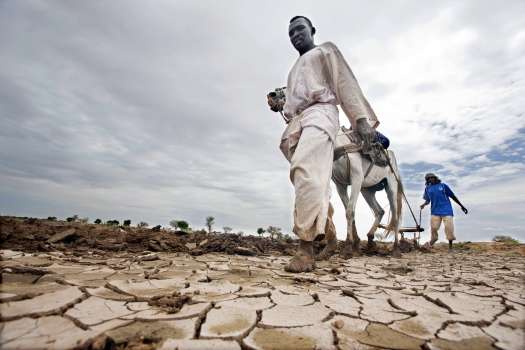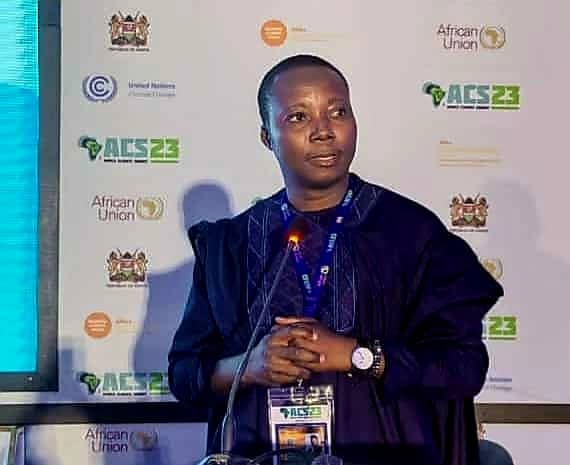As climate impacts intensify and international regulations tighten, the call for companies and public institutions in Ghana to develop Climate Transition Plans (CTPs) has reached a new level of urgency.
Cedric Dzelu, Technical Director at the Office of the Minister of State for Climate Change and Sustainability, has issued a clarion call to action: every institution, public or private, must now embed climate action into its strategic roadmap if Ghana is to achieve its climate and development objectives.
Mr. Dzelu made it clear that transition plans are no longer optional or symbolic. In his words, “In the face of escalating climate risks and mounting global expectations, the question is no longer whether we act—but how, and how fast.”
Mr. Dzelu described Climate Transition Plans as “strategic roadmaps” that define how entities will shift from high-carbon to low-carbon or net-zero pathways.
He emphasized that these plans bridge the gap between ambition and action, linking climate responsibility directly to long-term economic resilience and competitiveness.
Unlike traditional sustainability pledges, he noted, a well-crafted CTP integrates climate into a company or agency’s business model, investment priorities, and risk strategy.
According to Dzelu, many companies, both local and multinational have already pledged net-zero targets, yet a significant number lack concrete implementation strategies.

He warned, “Targets without plans are empty promises,” stressing that the absence of credible pathways undermines public trust, investor confidence, and long-term value creation.
He urged leaders in the private sector to take the lead, citing their central role in Ghana’s economic growth and emissions profile.
“The private sector is not just a key contributor to emissions; it is also the engine for innovation, job creation, and industrial transformation.
“That’s why it must be at the forefront of climate transition planning.”
Cedric Dzelu, Technical Director at the Office of the Minister of State for Climate Change and Sustainability
Mr. Dzelu argued that by developing robust CTPs, businesses could mitigate regulatory exposure, attract green finance, future-proof their supply chains, and position themselves as leaders in sustainable innovation.
He highlighted the growing global trend of mandatory disclosure frameworks such as the Task Force on Climate-related Financial Disclosures (TCFD), the International Sustainability Standards Board (ISSB), and the EU’s Corporate Sustainability Reporting Directive (CSRD), which require companies to publicly outline their climate transition strategies.
Public Sector Must Lead

Importantly, the call to action was not limited to the private sector. Mr. Dzelu stressed that government institutions must also lead by example.
“Ministries, agencies, and local governments must walk the talk. Transition plans for public institutions are critical.
“They help align operations with Ghana’s updated Nationally Determined Contributions and reduce emissions from public buildings, transport fleets, and procurement systems.”
Cedric Dzelu, Technical Director at the Office of the Minister of State for Climate Change and Sustainability
He underscored that a CTP is a governance tool that not only supports national decarbonisation goals but also builds institutional credibility and strengthens public service delivery in a climate-conscious era.
Dzelu outlined key components of a credible climate transition plan, including the need for strong governance, greenhouse gas baseline assessments, science-aligned targets, and sector-specific mitigation strategies.
He also emphasized the importance of resilience-building measures such as climate-smart infrastructure and nature-based solutions, alongside financial planning, public engagement, and transparent monitoring mechanisms.

“We must ensure our plans include just transition frameworks that protect workers, create green jobs, and prioritise inclusion for youth and women. A transition is only sustainable if it is fair.”
Cedric Dzelu, Technical Director at the Office of the Minister of State for Climate Change and Sustainability
From a Ghanaian perspective, Mr. Dzelu said there is immense potential for national leadership in green transformation.
“Ghana can lead the continent in sustainable industrialisation.
“But we need policies that support transition planning, de-risk investments, and open access to climate finance, especially for SMEs.”
Cedric Dzelu, Technical Director at the Office of the Minister of State for Climate Change and Sustainability
He pointed to critical national reforms including subsidy realignments, the promotion of electric mobility, and the expansion of renewable energy as clear signals that Ghana is moving in the right direction.
However, he cautioned that these gains must be institutionalized through structured transition plans that deliver results.
Accelerating Climate Transition Planning

Looking ahead, Mr. Dzelu outlined several steps to fast-track CTP integration across sectors.
These include the creation of technical assistance platforms for SMEs, embedding CTP requirements into national development frameworks, and mobilising public-private partnerships to finance implementation.
“We must activate local solutions and international partnerships to build a credible pipeline of climate investments.”
Cedric Dzelu, Technical Director at the Office of the Minister of State for Climate Change and Sustainability
In his closing remarks, Dzelu framed climate transition planning as an exercise in national survival and competitiveness.
“In a time of uncertainty, a Climate Transition Plan is your compass. Whether you are a business leader, public official, investor, or entrepreneur, now is the time to act, not react.
“Develop your plan, disclose your intentions, engage your people, and align with the future. Because climate change won’t wait. And neither should your strategy.”
Cedric Dzelu, Technical Director at the Office of the Minister of State for Climate Change and Sustainability
As Ghana gears up for COP30 and deepens its energy transition efforts, Dzelu’s remarks highlight the central role of proactive, structured climate planning in delivering on both national and international commitments.
READ ALSO: Ghana Fire Service Records Major Progress Amid Resource Constraints




















